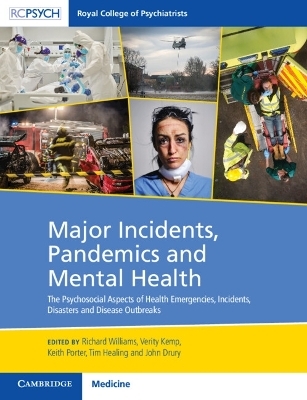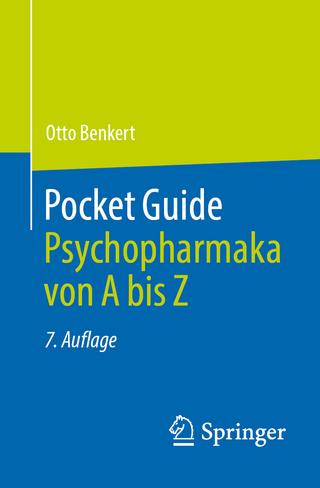
Major Incidents, Pandemics and Mental Health
Cambridge University Press (Verlag)
978-1-009-01121-1 (ISBN)
The COVID-19 pandemic has shown that all emergencies, major incidents and disease outbreaks can have substantial mental health consequences, and it has demonstrated the proven need for additional care for populations in the wake of disasters. This book brings together practice and recent developments in pre-hospital emergency care, emergency medicine and major trauma care with the wellbeing, psychosocial and mental health aspects of preparing for and responding to emergencies, incidents, terrorism, disasters, epidemics, and pandemics. Practical suggestions are included for future planning to provide better care for people caught up in emergencies. Setting it apart from other books on emergency preparedness is its specific focus on the psychosocial demands imposed on staff of healthcare and responding services. Featuring expert contributions from a wide variety of disciplines, this book appeals to people working within mental healthcare, emergency care, pre-hospital medicine, Blue Light services, public health, humanitarian care, emergency planning, and disaster management.
Professor Richard Williams OBE, TD, is Emeritus Professor of Mental Health Strategy in the Welsh Institute for Health and Social Care at the University of South Wales, UK. He was previously Presidential Lead on Disaster Management for the Royal College of Psychiatrists from 2008 to 2014 and 2017 to 2020, Presidential Lead on COVID-19, Emergency Preparedness and Mental Health from 2020 to 2023, Director of the Psychosocial and Mental Health Programme of the Faculty of Pre-Hospital Care of the Royal College of Surgeons of Edinburgh from 2018 to 2022 and an adviser to NHS England through the H1N1 and COVID-19 Pandemics. Ms Verity Kemp is an independent consultant specialising in emergency preparedness, resilience, and response, with prior senior management experience in the NHS and healthcare management working at all levels from hospital to central government. In the early 21st Century, she managed the review of NHS emergency planning guidance while associated with the Department of Health's Emergency Preparedness Division. Professor Sir Keith Porter CStJ, is Emeritus Professor of Clinical Traumatology in the University of Birmingham, and a former Consultant Trauma Surgeon and major trauma clinical lead for Queen Elizabeth Hospital Birmingham and the West Midlands Trauma Network. He was also civilian clinical lead for interface between the Queen Elizabeth Hospital Birmingham and the Royal Centre for Defence Medicine, UK. He was also Chairman of Trauma Care and co-founder of citizenAID, and Honorary Colonel of 202 Field Hospital RAMC. Dr Tim Healing initially trained in zoology and studied the role of disease in the population dynamics of island dwelling rodents. He trained in clinical microbiology at the Royal London Hospital. He was on the staff of the Communicable Disease Surveillance Centre before working for thirty years in humanitarian aid with NGOs and the UN. He ran the Conflict and Catastrophe Medicine Course at the Worshipful Society of Apothecaries. Professor John Drury is Professor of Social Psychology in the School of Psychology at the University of Sussex, UK. He teaches psychology for crowd safety to the UK's Fire and Rescue Services and to crowd safety managers. His research on collective resilience informs the Civil Contingencies Secretariat's National Risk Assessments. During the COVID-19 pandemic, he participated in the Independent Scientific Pandemic Insights Group on Behaviours (SPI-B) that reported to the UK government's Scientific Advisory Group for Emergencies (SAGE).
Section 1. The Nature and Impacts of 21st Century Healthcare Emergencies: 1. Emergencies, incidents, disasters, disease outbreaks and mental health: the scope of this book Professor Richard Williams; 2. How the world views trauma and trauma care Professor Julian Redhead; 3. How the world views the mental health implications of traumatic events, major incidents and serious contagious diseases Professor John Lord Alderdice; 4. Two personal perspectives on trauma and recovery Toni Wallace and Tom Renninson; 5. How emergencies, incidents, disasters and disease outbreaks affect people and healthcare practitioners Dr John Stancombe, Dr Suzy Stokes, Dr Andy Wood and Professor Richard Williams; 6. The impact of emergencies, terrorism and disease on children and their families Professor Prathiba Chitsabesan, Dr Brian Jacobs and Dr Raphael Kelvin; 7. The impacts of urbanising the world's population on emergencies, incidents, disasters and disease outbreaks Dr Tim Healing; 8. Myths about disasters Professor David E. Alexander; 9. Primary and secondary stressors: the ways in which traumatic events are stressful Professor Richard Williams, Dr Evangelos Ntontis, Professor John Drury, Dr Khalifah Alfadhli and Professor Richard Amlôt; 10. The differing challenges posed by big bang, rising tide and longer-term incidents affecting local and dispersed populations Professor Chris Brewin, Dr Kate Allsopp, Dr Talya Greene and Professor Richard Williams; 11. Mental health impacts of multiple disaster exposures Professor Claire Leppold and Dr Lennart Reifels; 12. The common ground in the mental health impacts of emergencies, incidents, disasters, disease outbreaks and conflict and a framework for responding to people's needs Professor Richard Williams, Dr John Stancombe and Professor James Ryan; Section 2. Clinical Aspects of Traumatic Injuries, Epidemics and Pandemics: 13. Advances in pre-hospital care Professor Sir Keith Porter and Mr Emir Battaloglu; 14. The changing face of clinical medicine in major trauma: lessons from civilian practice and military deployments Miss J. J. Lee and Professor Sir Keith Porter; 15. The changing face of traumatic injury: increasing experiences of penetrating gun and knife injuries and their treatment Mr Tom Konig; 16. Lessons from history and the epidemiology of severe epidemics and pandemics: plague, cholera, influenza, viral haemorrhagic fevers, and coronaviruses Dr Tim Healing; 17. The health aspects of epidemics and pandemics Group Captain Andy Green and Dr Sharon Irvine; 18. Challenges in managing epidemics and pandemics illustrated by Ebola and covid-19: a case study perspective Dr Claire Bayntun; Section 3. The Role of the Public in Emergencies: Survivors, Bystanders and 'Volunteers': 19. The role of the public understanding of group processes in emergencies, incidents, disasters and disease outbreaks Professor John Drury; 20. Social identity and traumatic stress in the context of an earthquake and a pandemic: understanding the roles of shared and isolating social experiences Professor Orla Muldoon; 21. Mobilisation and deterioration of social support following disasters resulting from natural and human-induced hazards Professor Krzysztof Kaniasty and Beata Urbańska; 22. Collective responses to terrorist attacks Dr Chris Cocking and Dr Anne Templeton; 23. Collective psychosocial resilience as a group process following flooding: how it arises and how groups can sustain it Dr Evangelos Ntontis and Dr Meng Zhang; 24. Facilitating the public response to covid-19: mutual aid and group processes Professor John Drury, Dr Evangelos Ntontis, Dr Maria Fernandes-Jesus and Guanlan Mao; 25. The social psychology of mass casualty decontamination in CBRN incidents Dr Holly Carter, Dr Charles Symons, Dr Dale Weston and Professor Richard Amlôt; 26. Factors that determine wider solidarity responses after a major incide
| Erscheinungsdatum | 23.01.2024 |
|---|---|
| Zusatzinfo | Worked examples or Exercises |
| Verlagsort | Cambridge |
| Sprache | englisch |
| Maße | 190 x 245 mm |
| Gewicht | 934 g |
| Themenwelt | Geisteswissenschaften ► Psychologie ► Klinische Psychologie |
| Medizin / Pharmazie ► Gesundheitswesen | |
| Medizin / Pharmazie ► Medizinische Fachgebiete ► Notfallmedizin | |
| Medizin / Pharmazie ► Medizinische Fachgebiete ► Psychiatrie / Psychotherapie | |
| ISBN-10 | 1-009-01121-9 / 1009011219 |
| ISBN-13 | 978-1-009-01121-1 / 9781009011211 |
| Zustand | Neuware |
| Informationen gemäß Produktsicherheitsverordnung (GPSR) | |
| Haben Sie eine Frage zum Produkt? |
aus dem Bereich


